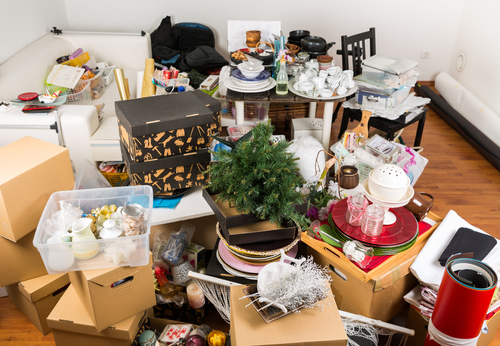Senior Hoarding Syndrome: Understanding Hoarding in Older Adults
Category:

Hoarding is a difficult situation that affects around 4% of the population – although recent research suggests that the number is rising and is closer to 6% overall. Hoarding has a disproportionately negative effect on the elderly population, particularly impacting mobility and safety in the home.
Understanding Hoarding in Older Adults
There are many different reasons your elderly loved one may be suffering from senior hoarding syndrome. Hoarding is often a “side effect,” so to speak, of depression. Seniors who are depressed or lonely tend to hoard things that remind them of happier times. They may also hoard because it gives them a sense of control, when control over their physical or mental facilities may be failing. A person can hoard anything – from small objects and knick-knacks to living, breathing animals.
Whatever the cause, elderly hoarding is dangerous. It can lead to unsafe and unsanitary conditions and get in the way of a senior’s determination to age at home. Piles of objects around the house make mobility difficult and can increase the risk of a fall and fall-related injury. A social worker or visiting nurse who enters a senior’s home will check for safe pathways for movement as one of their first tasks. A house full of things is also more difficult to keep clean, making health concerns in an elderly hoarder’s home.
Hoarding Help for Seniors
Helping your hoarding elderly parents or loved ones may be more difficult than you anticipate. Hoarders don’t want to let go of their hoard and simple logic like telling them it is not safe will not usually cut it. TV shows that bring in groups of people to empty a hoarder’s house rarely work in the long run – the hoarder simply begins again once the cameras stop running. Studies have shown that the key to helping a hoarder is trust.
Here are some tips to help you if you need to deal with a hoarder in the family:
-
Find a Support System – Tackling a hoard is a huge undertaking and you’re going to need support – a friend, therapist, or even an online support group. While you know you have your hoarding family member’s best interest at heart, you also know anyone who wants to touch their stuff is the enemy. You will need a place to vent and cope with the emotional tasks in front of you.
-
Establish Trust – Theoretically, your relationship with your loved one is already built on trust. But you basically need to build a separate trust when it comes to going through the hoard. Be patient. Clearly and often reiterate that you respect your loved one’s decisions. Don’t sneak anything you consider garbage out the back door, as they are certain to notice, and this will damage your relationship in the long run.
-
Have Realistic Goals – This is going to be a long process – not a long, sweaty weekend of work, but more like a process that could take years. Set small, achievable goals, like cleaning off one shelf of a bookcase.
-
Celebrate Your Wins – Once you clean off that bookcase, party! Acknowledge the success and how challenging it was for the hoarder to make the decision to get rid of things. Use positive reinforcement and focus on how safe, organized and healthy you are making the space.
Download Our Home Safety Guide
You can seek medical advice from a doctor to assist with the hoarding. They may determine that hoarding is related to anxiety or depression which can be helped with medication. Ultimately, dealing with hoarding will be a long and difficult process that can be achieved with patience, understanding, and work.
Subscribe
Date: 2022-05-31
Category:


